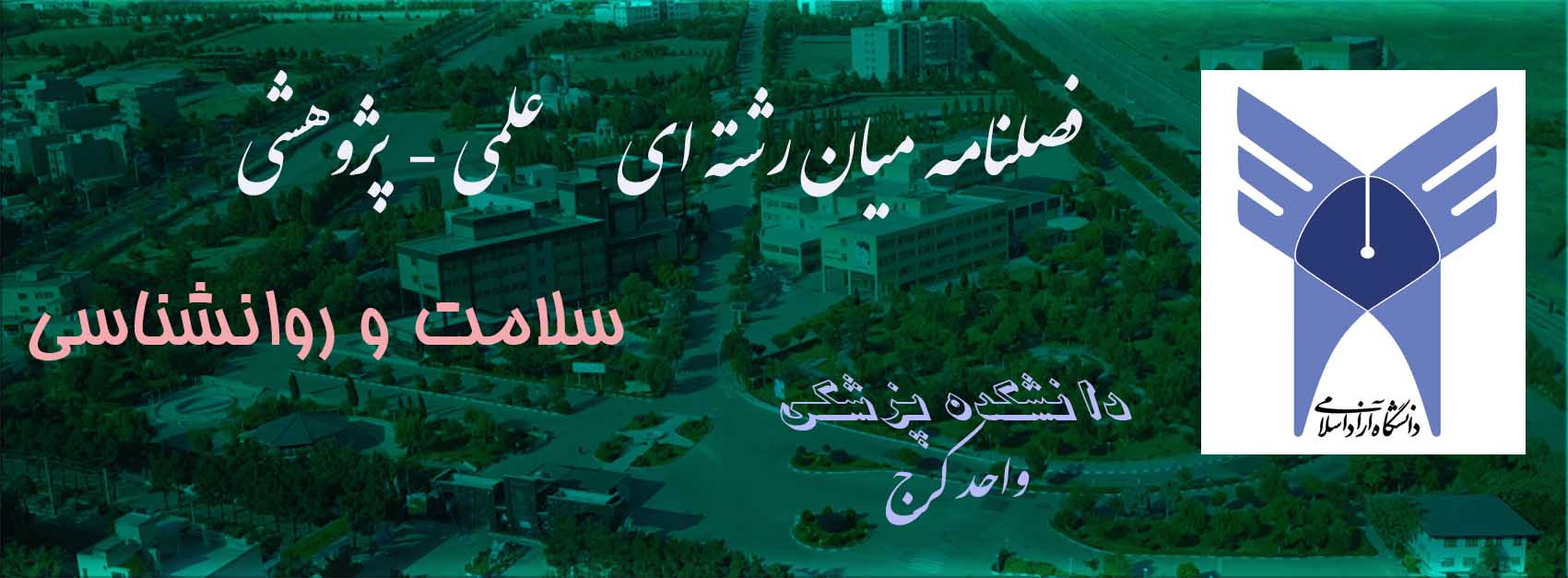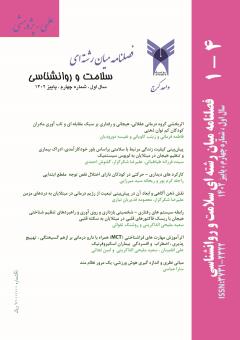اثرآموزش مهارت های فراشناختی (MCT) همراه با دارو درمانی بر ازهم گسیختگی ، تهییج پذیری ، اضطراب و افسردگی بیماران اسکیزوفرنیک (نویسندگان: سعید ملیحی الذاکرینی / علی اطمینان / امین نجاتی)
محورهای موضوعی : رواندرمانی فراشناختی
1 - عضو تمام وقت هیئت علمی و مدیر داخلی نشریه
کلید واژه: دارودرمانی , آموزش مهارت های فراشناختی (MCT) , علائم ازهم گسیختگی , تهییج پذیری , اضطراب و افسردگی , بیماران اسکیزوفرنیک ,
چکیده مقاله :
پژوهش حاضر با هدف مقایسه اثر دارودرمانی با آموزش مهارت های فراشناختی (MCT) همراه با دارو درمانی بر علائم ازهم گسیختگی ، تهییج پذیری ، اضطراب و افسردگی در بیماران اسکیزوفرنیک و در قالب طرح پژوهشی نیمه آزمایشی پیش آزمون ، پس آزمون و کنترل با کاربندی بالینی با روش نمونه گیری هدفمند ، بر روی تعداد 34 بیمار مبتلا به اختلال اسکیزوفرنیا (برای هریک از گروههای کنترل و آزمایش 17 نفر در نظر گرفته شد) صورت گرفت . نتایج حاصل از آزمون های رگرسیون چندمتغیره با اندازه گیری مکرر برای اثر مداخله دارو درمانی محض، با آموزش مهارت های فراشناختی همراه با دارو درمانی بر علائم ازهم گسیختگی ، تهییج پذیری ، اضطراب و افسردگی در بیماران اسکیزوفرن نشان می دهد که بین مؤلفههای تحقیق (علائم ازهم گسیختگی ، تهییج پذیری ، اضطراب و افسردگی در اسکیزوفرنیا) گروه دارو درمانی محض، با گروه آزمایشی دریافت کننده ی آموزش مهارتهای فراشناختی همراه با دارو درمانی در سه مرحله پیشآزمون، پسآزمون و پیگیری تفاوت وجود دارد. با توجه به اینکه نمرات علائم ازهم گسیختگی ، تهییج پذیری ، اضطراب و افسردگی در اسکیزوفرنیا در گروه درمان فراشناختی به همراه دارو به شکل معناداری پایین تر از گروهی بود که فقط درمان دارویی دریافت کرده بودند، لذا نتایج نشان دهنده اثر معنی دار درمان فراشناختی به همراه دارو در گروه آزمایش نسبت به گروه کنترل می باشد.و نمرات علائم ازهم گسیختگی ، تهییج پذیری ، اضطراب و افسردگی در اسکیزوفرنیا در گروه کنترل به شکل معناداری بیشتر از گروهی بود که درمانی فراشناختی به همراه دارو درمانی دریافت کرده بودند.
The present study aims to examine the effect of metacognitive skills training (MCT) along with drug therapy on Conceptual disorganization , excitement , anxiety and depressive symptoms of schizophrenic patients and in the form of a semi-experimental research design of pre-test, post-test and control with clinical application with purposeful sampling method. It was done on 34 patients with schizophrenia disorder (17 people were considered for each of the control and experimental groups).
The results of multivariate regression tests with repeated measurements for the effect of pure drug therapy intervention, with training of metacognitive skills along with drug therapy on Conceptual disorganization , excitement , anxiety and depressive symptoms symptoms of schizophrenia patients show that between the research components of the drug group There is a difference between pure therapy and the experimental group receiving metacognitive skills training along with drug therapy in the three stages of pre-test, post-test and follow-up.
Considering that the scores of Conceptual disorganization , excitement , anxiety and depressive symptoms symptoms of schizophrenia in the group of metacognitive therapy with medication were significantly lower than the group that received only drug treatment, therefore the results show the significant effect of metacognitive therapy with medication in the experimental group. and the scores of Conceptual disorganization , excitement , anxiety and depressive symptoms symptoms of schizophrenia in the control group were significantly higher than the group that received metacognitive therapy along with drug therapy.
افشاری، بهروز؛ خصریان، کیامرث؛ فقیهی، علی. 1398 بررسی و مقایسه عملکردهای شناختی و اجرایی در بیماران اسکیزوفرنیا و دوقطبی. مجله دانشکده پزشکی اصفهان. شماره 37.
موریتز، استفان؛ وودوارد، تود اس؛ هاوشیلت، ماریت؛ ترجمه و تدوین ملیحی الذاکرینی، سعید؛ 1399، راهنمای عملی و بالینی روان درمانی فراشناختی برای روان پریشی. انتشارات دنیای درون. تهران.
یوسفی، رحیم؛ جنگی اقدم، حمید؛ سیوانی زاده، مجید؛ ادهمیان، الهام. 1387 مقایسه فراشناخت ها در بیماران مبتلا به اسکیزوفرنیا اختلال اضطرابی و گروه کنترل غیر بیمار. تازه های علوم شناختی. شماره 2.
References:
Acuña V, Otto A, Cavieres A, Villalobos H. (2022). Efficacy of Metacognitive Training in a Chilean Sample of People with Schizophrenia.
Rev Colomb Psiquiatr (Engl Ed)Oct-Dec;51(4):301-308. English, Spanish. doi: rcpeng.2020.12.002. Epub 2022 Nov 8.
PMID: 36369153.
Bowers . L (2005) , Reasons for admission and their implications for the nature of acute inpatient psychiatric nursing , The Journal
of Psychiatric and Mental Health Nursing, Volume 12 , issue 2 , https://doi.org/10.1111/j.1365-2850.2004.00825.x
Danielle B. Abel*, Michelle P. Salyers, Wei Wu, Mahogany A. Monette, Kyle S. Minor (2021) , Quality versus Quantity: Determining
Real-world Social Functioning Deficits in Schizophrenia, Psychiatry Res. 2021 July ; 301: 113980. doi:10.1016/j.psychres.
2021.113980.
Freeman , Daniel , (2006) , Delusions in the nonclinical population , Current Psychiatry Reports volume 8, pages 191–204
Morrison , Anthony P , manualised treatment protocol to guide delivery of evidence-based cognitive therapy for people with distressing
psychosis: learning from clinical trials, Psychosis , http://www.tandfonline.com/action/journalInformation?journalCode=
rpsy20
Javier-David Lopez-Morinigo, Olesya Ajnakina, Adela Sánchez-Escribano Martínez, Paula-Jhoana Escobedo-Aedo, Verónica
González Ruiz-Ruano, Sergio Sánchez-Alonso, Laura Mata-Iturralde, Laura Muñoz-Lorenzo, Susana Ochoa, Enrique Baca-García,
Anthony S David. 2020 Can metacognitive interventions improve insight in schizophrenia spectrum disorders? A systematic
review and meta-analysis. Psychol Med. Oct;50(14):2289-2301. doi: 10.1017/S0033291720003384. Epub 2020 Oct14.PMID:
33050956.
Martin Rouy, Pauline Saliou, Ladislas Nalborczyk, Michael Pereira, Paul Roux, Nathan Faivre. 2021. Systematic review and
meta-analysis of metacognitive abilities in individuals with schizophrenia spectrum disorders. PMID: 33757817 DOI: 10.1016/j.
neubiorev.03.017
Meunier Hotte- A, Penney D, Mendelson D, Thibaudeau É, Moritz S, Lepage M,Sauvé G. Effects of metacognitive training (MCT)
on social cognition for schizophrenia spectrum and related psychotic disorders: a systematic review and meta-analysis. (2023) ,
Psychol Med. 2023 Sep 29:1-7. doi: 10.1017/S0033291723002611. Epub ahead of print. PMID: 37772399.
Morinigo Lopez JD, Martínez AS, Barrigón ML, Escobedo-Aedo PJ, Ruiz-Ruano VG,Sánchez-Alonso S, Mata-Iturralde L, Muñoz-
Lorenzo L, Cuadras D, Ochoa S, Baca- García E, David AS. (2023). A pilot 1-year follow-up randomised controlled trial
comparing metacognitive training to psychoeducation in schizophrenia: effects on insight. Schizophrenia Jan 30;9(1):7. doi/
s41537-022-00316-x. PMID: 36717598; PMCID: PMC9886217.
Zalzala, A., Fiszdon, J. M., Moritz, S., Wardwell, P., Petrik, T., Mathews, L., Shagan, D., Bracken, D., Bell, M. D., Pearlson, G. D.
& Choi, J., 01.09.2022, In: J NERV MENT DIS. 210, 9, p. 655-658 4 p.
Gawęda, Ł., Moritz, S., Ochoa, S. & So, S. H. W., 10.09.2021, Editorial: The Relationship Between Cognitive Biases and Psychosis:
Searching for Mechanisms , In: FRONT PSYCHIATRY. 12, p. 753317 753317.
Steffen Moritz , Mahesh Menon , Ryan Balzan , Todd S Woodward , (2023) , Metacognitive training for psychosis (MCT): past,
present, and future , Eur Arch Psychiatry Clin Neurosci .Jun;273(4):811-817.
Hamish J. McLeod , Andrew I. Gumley , Paul H. Lysaker (2014) , Metacognitive functioning predicts positive and negative symptoms
over 12 months in first episode psychosis , Journal of Psychiatric Research , Volume 54, , Pages 109-115
Linda Swanson, Helen Griffiths, Steffen Moritz, Simon Cervenka , (2022) , Metacognitive training for negative symptoms: Support
for the cognitive model , Journal of clinical psychology and psychotherapy , https://doi.org/10.1002/cpp.2809

